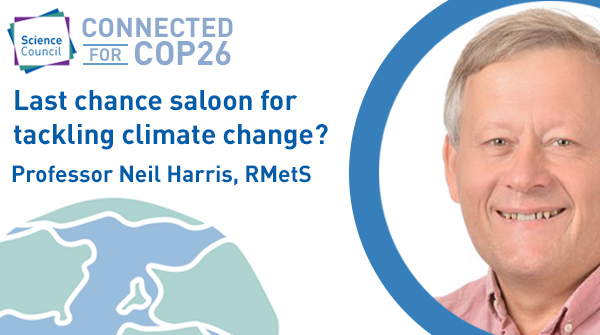
Connected for COP26: Last Chance Saloon for tackling climate change?
Professor Neil Harris, Cranfield University on behalf of the Royal Meterological Society.
COP-26 and the forthcoming IPCC Sixth Assessment Report will be seminal events in any history of climate change. Collectively, we face a series of decisions that will determine whether future generations see this moment as when we finally came to our collective senses and took action – or as the last, missed chance?
As a natural optimist, why am I so apprehensive just now? The rhetoric for the need to take action has never been louder. The large majority of countries and industries are signing up to Net Zero Carbon by 2050. Green technologies are coming on stream at an ever-faster rate. The financial sector has become alive to the issues. Even climate scepticism is becoming a thing of the past. And yet… And yet….
The main reason for my mood is the sequence of extraordinary events in recent weeks and months – temperature records smashed all over the world, intense wildfires, floods, record ice melt… the list goes on. They are shocking many climate scientists. My response to such events is two-fold: as a researcher, I wonder what if any science we missed and why, and whether we were too cautious in our statements; as a citizen, I wonder if we are too late to avoid the worst or whether there is still time. Delay rather than outright opposition is now the main risk.
From a rational perspective, it is even more important to keep a clear head and make good decisions.
We need to use our main assets (the remaining time, financial capital, and human capacity) in the most effective way. The limits on these assets are important constraints on what can be achieved in the next 29 years, especially when considering all the other challenges involved in meeting the UN Sustainable Development Goals. If a technology is going to take 10 years to develop, 10 years to make into an economically viable, large-scale equivalent and 10 years to roll out at global level, it will make very little contribution to the Net Carbon Zero Target in 2050 regardless of how much difference it makes after that. If it absorbs huge amounts of financial or human capital, is it the best option to promote now? Large reductions are required now if we are to stay on track, so resources have to be deployed now. Working through these issues – looking at the problem from the future – can be done only with experts from many fields in and out of academia. At Cranfield, a University strong in applied research and with strong industry relationships, we are working through issues for agriculture, energy, water, aviation, etc.
So as an atmospheric researcher, how best can I use my energy, expertise and experience to provide timely, actionable information?
First, improve knowledge which helps develop an effective pathway to reduce the climate impact of greenhouse gas emissions. Achieving this will require improved ways of estimating and monitoring their emissions. My own research concerns using lower-cost instruments in networks and new analytical approaches to provide emission estimates in studies of greenhouse gases, pollutants and natural systems in London, the Oxford-Cambridge Arc and woodlands. Such techniques will be essential for monitoring reductions in emissions at a national, local or facility level. The UK is one of the leaders in these areas and has the capability to remain so – let’s use these skills and experience.
Second, develop and use a range of models which provide clear guidance on how to adapt to the inevitable climate change. Adaptation is required and urgent – what information best informs those decisions? Robust ways to evaluate the relative importance of greenhouse gases, particularly the short-lived climate forcers, will help prioritise actions for emission reductions. Understanding the human dimension is critically important here. The Covid-19 experience shows how apparently stable social and economic systems can be brought to a shuddering stop – and how the best available scientific evidence can be both used and misused. New ways of thinking will be required to include the necessary semi-quantitative and qualitative understanding in these fields.
All this requires the climate community as a whole to evolve. New and rewarding opportunities are opening up for those entering the field, and many of the most exciting areas are at the interface with the real world. Some are long-term (we cannot forget post-2050 and post-2100) but the most urgent are near-term: individual sectors (agriculture, transport, housing, you name it) need specific information; better weather forecasts are now required not just for this week, but next year and the coming decade. Much of this is already happening – but it should happen as quickly as possible if we are to meet this challenge. No respectable military strategist would have left it so late before changing course.
